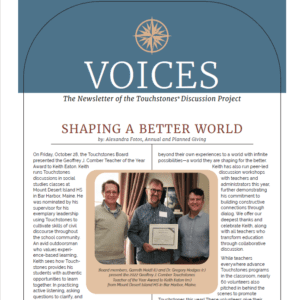Our curricula are research-based, grounded in best practices, and support not only content learning but also behavioral, classroom climate, and social-emotional learning goals.
Our programs have supported students in public schools, charter schools, independent schools, classical curriculum schools, international schools, and homeschool environments for more than 40 years.
Since 1984, our discussion curricula and programs have fostered understanding, leadership, and community in schools worldwide. We believe that all students come to the classroom with strengths. By sharing and examining their ideas through an authentic learning process like Touchstones, students move beyond traditional classroom discussion to better understanding each other, engaging in collaborative discussion, and developing leadership skills.
Touchstones Supports Your School’s Goals Inside and Outside the Classroom
What are schools saying about Touchstones?
“It was really exciting to me to watch the evolution of [my students’] thinking and then their ability to listen to one another and change their opinions…you begin to see the students develop a new respect for one another in terms of the kinds of comments and observations there able to make.”
Joy Corey
Teacher, Chesapeake Academy, MD
“I have absolutely loved teaching Touchstones this year. I have watched my students grow into expert conversationalists over the last several months. I was amazed recently when I had them discuss a piece that was not in our textbook and they were able to apply the Touchstones guidelines, make connections, and respectfully disagree with each other while using supporting arguments. It was awesome!”
R. Salmonsson
Teacher, Two Roads Charter School School, CO
“I appreciate the diversity of [Touchstones’] materials. [They] offer authentic stories as a springboard for class discussion“
B. Gaye
Teacher, Canyon Ridge Elementary, San Antonio, TX
“In my twenty years as an educator serving both urban and rural students, I have encountered no program that more explicitly positions students at the core of teaching and learning than Touchstones. “
M. Hodnicki
Principal, Paul Robeson Elementary School, Trenton, NJ
“Learning to talk to one another is our most important organizational goal…our schools depend on mutual understanding and effective communication. Touchstones helps us all to develop these skills and build a community.“
Kevin Topper
North Harford Middle School, Pylesville, MD
“Touchstones fundamentally changed my classroom dynamic. Before, I felt like I was working harder than my students were, just to drive the conversation forward. Now, I use what I learned in the training program to create engaging discussion questions that help students read carefully and make authentic connections to the text. Touchstones gives students the tools to join a discussion with confidence, and listen actively.”
C. Shryock
Teacher, Bishop McNamara High School, Forestville, MD
What does it mean to go #BeyondtheSocraticSeminar?
Although the Touchstones method shares some common elements with Socratic seminars, in Touchstones, discussion skills are prioritized to provide a foundation for exploring content in class; these skills are explicitly taught and systematically strengthened over time. The primary goal of Touchstones is to build the skills necessary for teachers and students to take part in inclusive discussions, in any context, driven by participants themselves. We focus on process because we believe strong discussion skills are a prerequisite for all other forms of collaboration.



 Join the
Join the